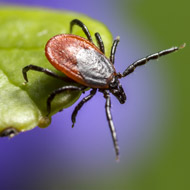
Veterinary practices urged to remain vigilant
Canine babesiosis is under control but veterinary practices should remain vigilant, according to researchers at the University of Liverpool.
A study published in Veterinary Record shows there is currently a 'sporadic and low background level' of Babesia infection in the UK that is likely associated with overseas risk.
Carried out by a team from the Small Animal Surveillance Network (SAVSNET), the study also confirmed a small cluster of eight Babesia cases in Chelmsford, Essex, close to the reported outbreak.
The clustering of these cases is associated with exposure to a locally infected tick population, the researchers say.
Since March this year, SAVSNET has seen no new diagnoses of Babesia in Chelmsford, suggesting the outbreak may now be under control. But while this is positive news, the researchers are warning practitioners to be aware of the localised risk of infection.
SAVSNET academic lead Dr Alan Radford said: "We would like to remind vets to keep Babesia in mind, especially in practices close to the outbreak, where infected ticks are likely to still be active, and persist in the coming years. Currently, this seems to be a rare disease but one we need to keep an eye on.
"One striking finding from our analysis is that ticks remain active in the winter, albeit at presumably low levels. It is, therefore, important that we continue to monitor tick activity, and we would encourage vets and nurses across the UK to keep recording information about tick bites they treat."
Babesiosis is transmitted to dogs by infected ticks, with symptoms including fever, jaundice and a lack of appetite. Although usually only found in mainland Europe, in February 2016 one Essex practice reported three cases of Babesia in dogs that had not travelled abroad.
In the study, SAVSNET - a partnership between the University of Liverpool and BSAVA - used electronic health records to assess the risk of this emerging disease in the UK.
Using data from 2015, the team analysed cases of reported tick bites and Babesia in dogs from 392 voluntary premises across the UK.
“We’ve shown that health informatics surveillance can help provide real-time local updates on important and emerging pathogens, such as Babesia," said study leader Dr Fernando Sánchez-Vizcaíno. "This could help monitor the response to outbreaks, and in the future contribute to their early detection.”
Real-time updates on the disease are now available to view on an interactive map on the SAVSNET website.



 The RCVS has announced a new version of its 1CPD mobile app, with enhanced features for veterinary surgeons and veterinary nurses to record their continuing professional development.
The RCVS has announced a new version of its 1CPD mobile app, with enhanced features for veterinary surgeons and veterinary nurses to record their continuing professional development.